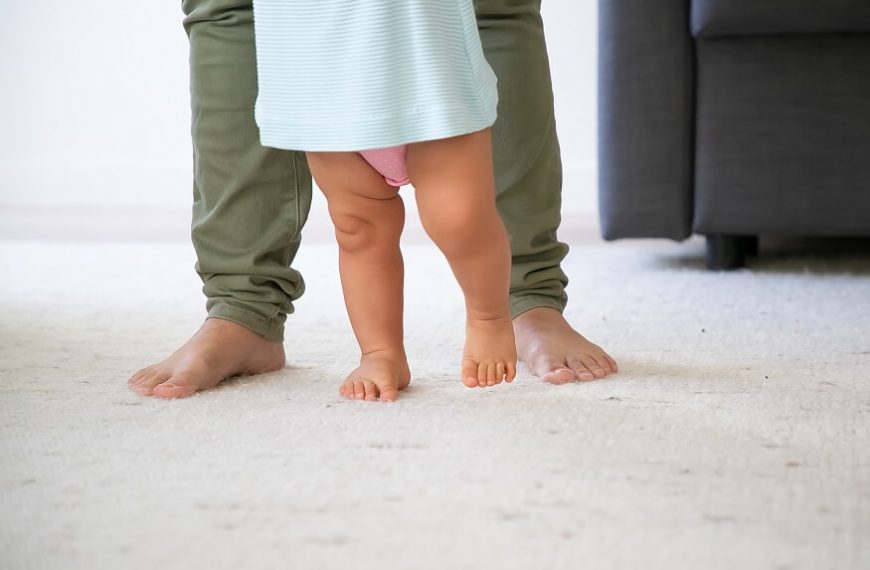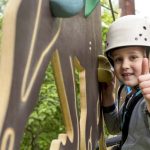As you may already be aware, one of the human body’s most perceptive organs is the feet. The bottom of the foot has a very delicate sole. When we discuss going barefoot, which is fairly common, our bodies benefit much from this practice. Grounding also refers to going barefoot. The ligaments hold the 26 bones and 35 joints of the foot together and provide support. A baby walks with flat feet because the muscles, bones, and ligaments in their feet are still developing. A child’s foot is very flexible and fat-padded. Babies that walk barefoot find it easier to distinguish between carpets, hard flooring, and grass.
Dr. Atchara Venakatraman, a child development specialist, child psychologist, infant nutritionist, and the creator of Bump Cradle, states that being barefoot is preferable unless you observe issues with your kid’s foot growth. There is a decrease in white blood cells as well as an increase in red blood cells when we connect with the soil and walk barefoot, which suggests improved immunity.
Kids like removing their shoes. How come, though? You will learn the advantages of letting your kids play barefoot in this blog.
Your youngster most likely belongs to the sizable number of kids who like taking off their shoes and playing barefoot inside the house. They will undoubtedly find a method to remove their shoes if you even briefly take your eyes off of them. They might feel more emancipated when they can move about freely.
But why do kids always seem to want to go about barefoot? Should we just leave them be? Or are you going to encourage a negative habit? No more worries! This post will teach you about several advantages you didn’t know existed. You won’t believe the old lie that letting your kids play barefoot will make them sick any longer!
Why Do Children Love To Roam Around Barefoot?
Without a doubt, your youngster tears off his socks after taking off his shoes. Why, therefore, should we be shocked? It’s not simply about feeling at ease and liberated. Additionally, it involves studying his toes to improve their motility.
Of course, there are instances when it may appear that your child is just cranky or misbehaving. You could be tempted to believe that your young child is acting out or rebelling against their parents. However, this behavior actually stems from a need that is more pressing than you would realize.
The truth is that youngsters benefit much from going barefoot. We all know that newborns have a flat feed. Did you know that letting your child walk barefoot really helps the arch develop in their feet? Children who are barefoot also have a greater understanding of the ground. They, therefore, have superior balance, which helps them prevent trips and falls.
A youngster is also learning when she starts taking off her own shoes and putting on her own clothes. She is using crucial talents and skills that are formed in infancy. Her motor abilities are improving bit by little.
You should not be shocked if your youngster disobeys obvious and uncomplicated rules like “no running around barefoot” or “no taking off your shoes.” Parents’ tolerance may be put to the test when their kids break established rules. But remember that your child’s stubbornness is only a confirmation of who he is as a person.
It is precisely for the same reason that experts advise letting kids wear bare feet indoors. The same holds true whether you’re in the city or out in nature. However, you might wish to use non-slip socks when you’re indoors. These will shield your infant from falls and help him stay warm.
The Significance Of Toddlers Walking Barefoot Is As Follows:
- It Aids In Enabling Ideal Muscular Growth: According to studies, when babies walk barefoot the majority of the time, their foot muscles become stronger and more coordinated. It gives them posture while they walk barefoot. Your baby’s tiny feet have extremely soft bones at birth, but as they grow, the bones get firmer, and the joints, muscles, and ligaments in the feet form. Sometimes, the newborn muscles’ ability to develop might be attributed to walking barefoot.
- It Enhances Attentiveness And Nimbleness: Your infant’s brain receives information through nerve endings when their little foot makes direct touch with the ground, instructing their body how to balance itself. It is considerably more difficult for your infant to balance while they are wearing shoes since the additional layer of protection to the baby’s feet prevents the brain from receiving information when they are doing so. Your infant can navigate the various surfaces securely while barefoot. Toddlers can move their bodies in a variety of ways because running and walking on varied surfaces like grass, sand, and dirt gives them the confidence to do so.
- It Enhances Sensory-Motor Development: “We’ve all observed how our young children use their hands and feet to explore objects. About 200,000 nerve endings may be found on the sole of the foot. Before they stand and walk, put their toes as well as feet onto the sofa, carpet, etc., a baby will feel a variety of sensations while they are barefoot. According to Dr. Venakatraman, keeping our newborns barefoot permits them to continue their sensory-motor development.
- The Takeaway: These days, it might be difficult to avoid purchasing children’s shoes. Allow your child to go barefoot to explore and learn a lot about his or her body, movement, and surroundings after using them for picture opportunities.
- It’s Beneficial For Little Feet: Over the first few years of life, there is a lot of strengthening and alignment that has to be done with small feet. Playing barefoot allows a child’s tiny muscles, ligaments, and nerves in their feet to be fully activated. A child’s foot has a staggering number of microscopic structures, and the more stimulation given to the foot, ankle, knee, and leg throughout the early months and years of walking, the more likely it is that these parts will develop strength and function at their peak. The usage of feet without shoes or ridge supports increases arches, bone and muscle strength, ligament flexibility, and stability. It aids in supporting your child’s feet to prevent flat feet in the future.
- Little Feet Want Comfort The Most: The ideal setting for maximizing barefoot time is in the comfort of our own homes. Exploring interior surfaces like carpet, tiles, floors, and climbing furniture is a blast. Going barefoot in the outdoors is much better. There are so many alternatives for barefoot play and mental stimulation, including grass, gravel, decks, sandpits, cement, and dirt. Gumboots are near the door in case there are bindis or my kids don’t want to have their feet wet occasionally, but they rarely get used.
- It Benefits Developing Brains: Going barefoot increases the quality and amount of input to all parts of the brain, promoting healthy growth. Little brains develop dependent on input. The capacity to accurately sense our surroundings through our feet aids in the development of good spatial awareness, which in turn promotes safe body control and movement, ideal balance, postural stability, and coordination. The more time spent barefoot paired with a diversity of surfaces improves the brain’s input, supporting a child’s growth during the course of childhood.
- It’s Beneficial For Little Bodies:Small bodies are better able to absorb the wonderful negative ions available when tiny feet are planted on the Earth without anything in between. By enhancing our system’s “calm rest and digest” (parasympathetic nervous system) function, earthing or grounding is a powerful technique to help the nervous system control. Going barefoot is a fantastic technique to have in the self-regulation toolbox. It is wonderful for changing a poor mood, a “wounded up” youngster (or mom!), or to improve the feel-good vibrations. Suppose it’s on the sand beside an ocean or other significant body of water, bonus points.
Unbelievably, up until the age of nine months, infants’ feet receive touch information more quickly than their hands. So, when it comes to a baby’s brain development, feet are quite important. Infants’ feet are a valuable source of information about their environment. A child’s sense of space is further enhanced by being barefoot since his feet are constantly moving. In other words, removing constricting footwear from your child’s feet promotes better nervous system development. This then translates into the child’s motor skills developing properly. There’s more, too! Your child will become more conscious of her own body thanks to the tactile knowledge she receives from her bare feet. Your youngster may find it challenging to define despite how goofy it seems.
















